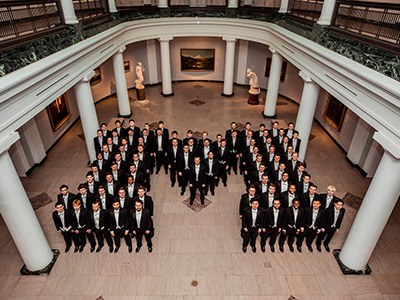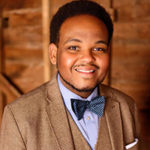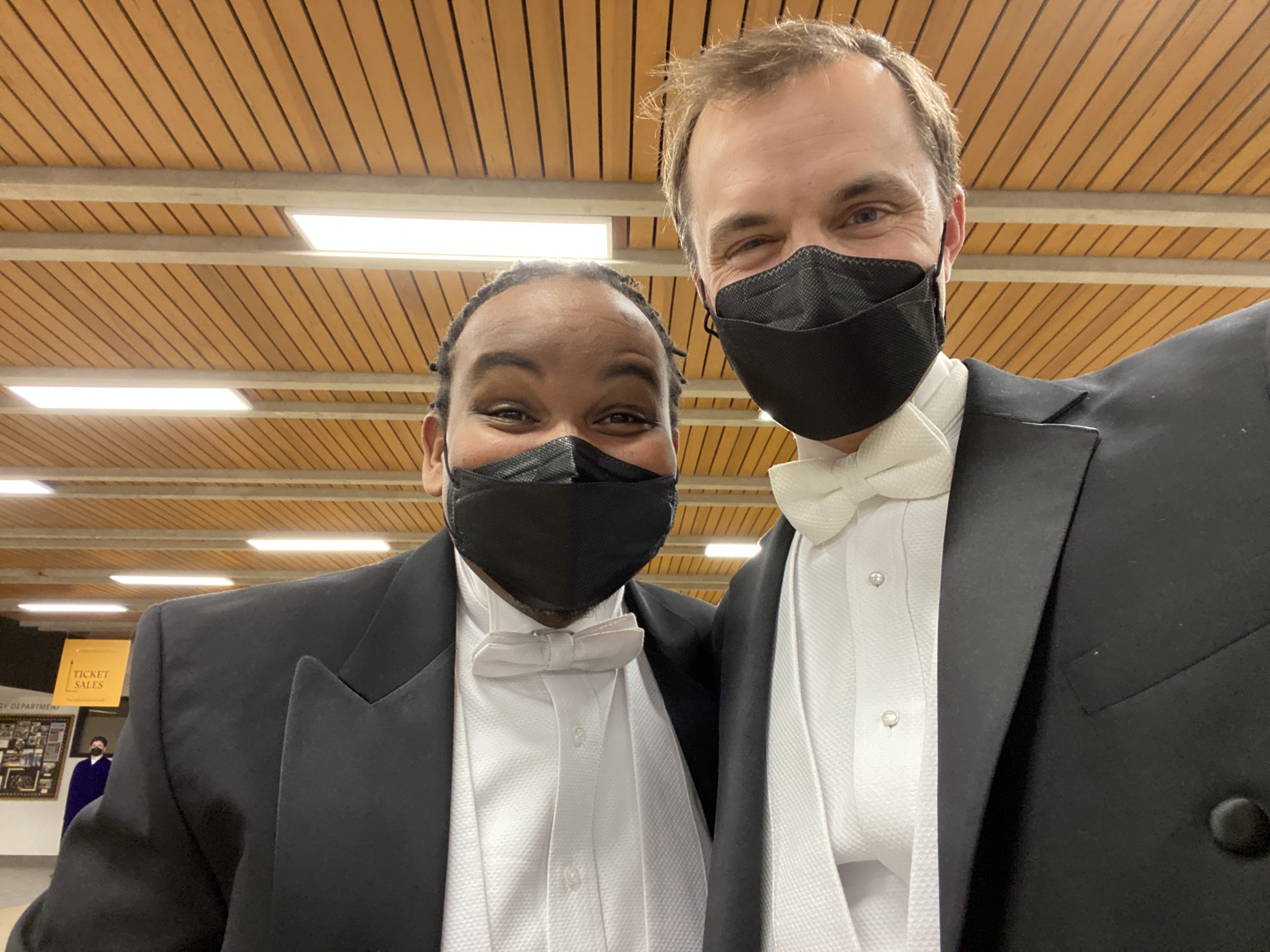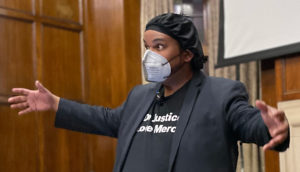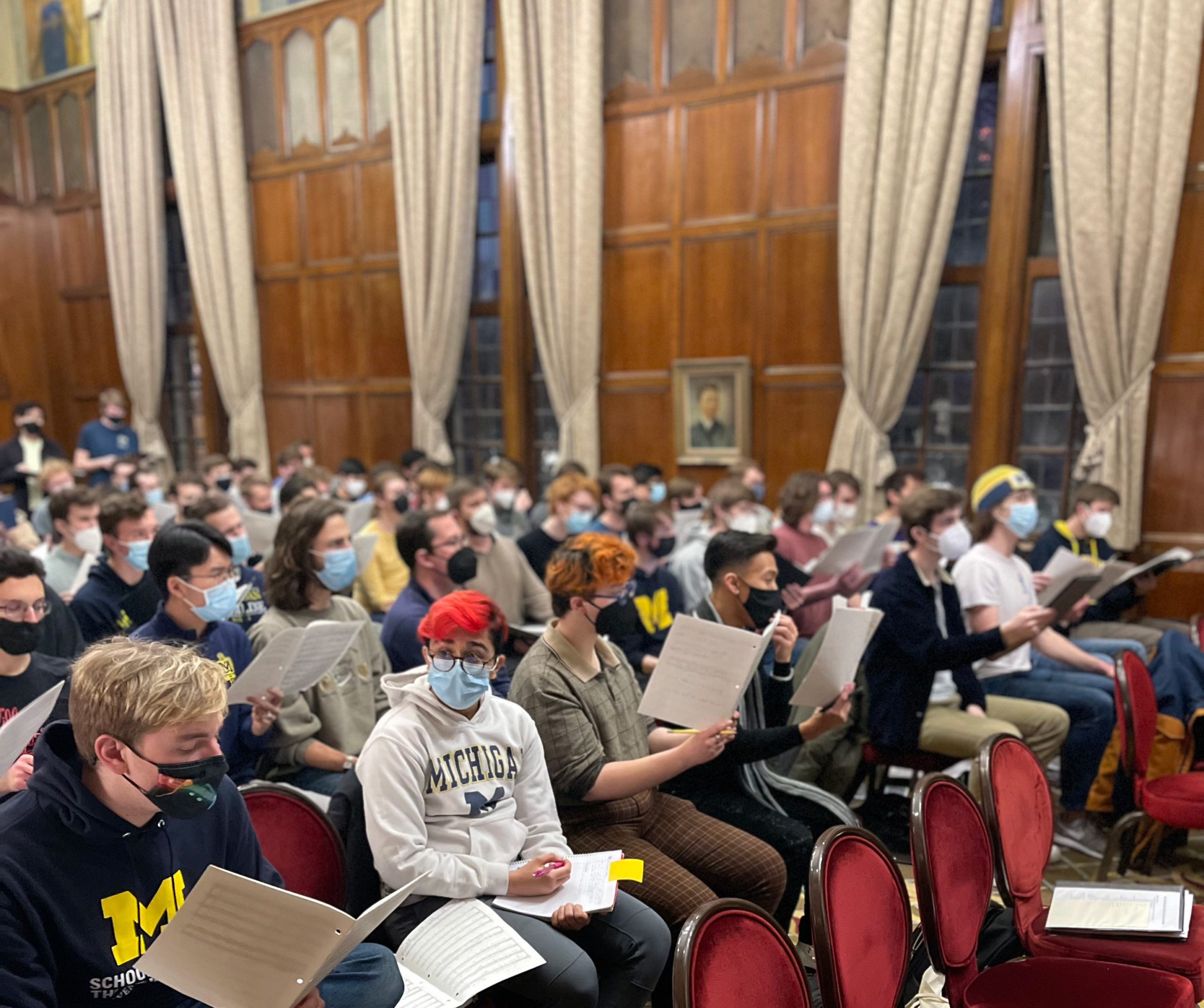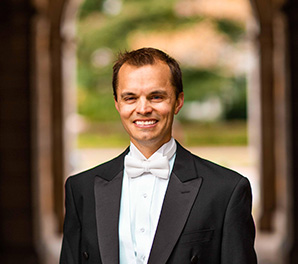Judy Galens
For the University of Michigan Men’s Glee Club (MGC), springtime is concert season, involving a big performance at Hill Auditorium as well as tours to other cities. This spring, however, will offer an extraordinary experience. MGC will premiere a new work by composer Tesfa Wondemagegnehu, To Repair, in a solo concert at the Lincoln Center’s Alice Tully Hall in Manhattan.
“It’s very special,” noted Mark Stover, School of Music, Theatre & Dance (SMTD) assistant professor of music, associate director of choirs, and conductor of MGC and University Choir. “We’ve been fortunate over the years. The Men’s Glee Club is 162 years running on this campus, so it’s the oldest student organization at the University of Michigan. And we have had some extraordinary experiences worldwide throughout our history. We definitely feel like this is going to be one of those.” Stover pointed out that the opportunity to perform at Lincoln Center came about expressly because of interest in Wondemagegnehu’s work. In addition to concerts in other cities, just over 100 members of the MGC will travel to New York for the April 7 performance, after which they will return to Ann Arbor for their 162nd Annual Spring Hill Concert, on April 9.“It’s All About Friendship”
In telling the story of how To Repair came about, Stover said, “It’s all about friendship. That’s where the story begins.” Prior to coming to U-M, Stover served on the music faculty of St. Olaf College, in Northfield, Minnesota, where he served as conductor of the St. Olaf Chapel Choir and Viking Chorus. While there, he met Wondemagegnehu, who was working in community and church choral spaces in the Twin Cities, and the two became friends. When Stover left to come to U-M, Wondemagegnehu succeeded him at St. Olaf as assistant professor of music and conductor of the Chapel Choir and Viking Chorus.
After George Floyd was killed by Minneapolis police officer Derek Chauvin on May 25, 2020, Stover and Wondemagegnehu began a lengthy (“like months-long,” Stover noted) conversation. “We were all processing what happened, but particularly Minnesotans and then even more particularly, Minnesotans from the Black community.” Stover asked Wondemagegnehu if he would be interested in composing a new choral work, commissioned by the MGC, “just responding to this moment, and thinking about things that you’re feeling, and letting music be a vehicle for that.” Wondemagegnehu loved the idea and agreed immediately.
Hitting the Road
In addition to his work as a professor, composer, and choral conductor, Wondemagegnehu is a passionate pitmaster. In 2020, he volunteered at a Juneteenth fundraising BBQ in the Minneapolis-St. Paul area, smoking pork shoulder and taking donations to support the work of lawyer and social justice activist Nekima Levy Armstrong. Afterward, he spoke with his friend and mentor Amanzi Arnett, who had some unvarnished advice for him.
Wondemagegnehu recalled him saying, “I love that you are doing this type of work, but you can do so much more. You’re capable of so much more, but before that happens, you need to go and learn. You need to immerse yourself in your community and immerse yourself in all communities around this country, and ask the question: what do we need to repair our communities?”
Wondemagegnehu’s response? “I was like, well, here we go.” And thus was born the idea for the “To Repair” pilgrimage, a tour launched the following summer. Wondemagegnehu drove to more than 40 cities in 60 days, asking questions and listening intently to the responses. He spoke to activists and business owners, religious leaders and social workers, academics and community sages, about the work being done and the vast ongoing need for justice and equity in Black communities. He visited site after site where unarmed Black people had been killed by police officers.
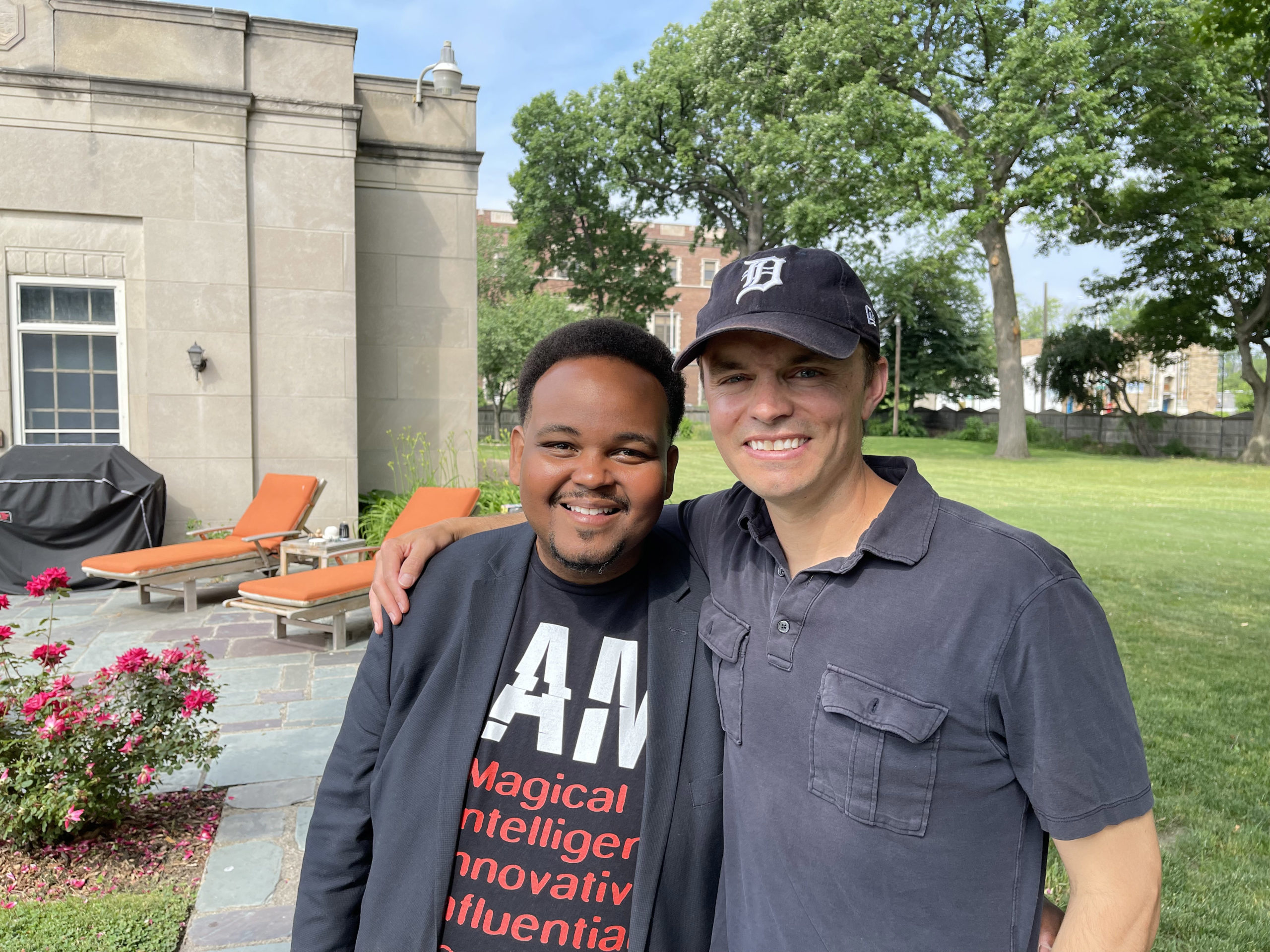
Wondemagegnehu and Stover, at the Motown Mansion in Detroit, during Wondemagegnehu’s summer 2021 pilgrimage.
Wondemagegnehu learned early in the trip that there was no point in trying to stick to a rigid itinerary. “During that journey,” he remembered, “there were just so many things that kept unfolding to make me realize that I was not in charge of the car. This white Prius was going to go exactly where it was supposed to go.” His openness to going where the conversations led him resulted in several eye-opening encounters with extraordinary individuals who have devoted their lives to community service and social justice. “Every day, there were experiences where it’s just like, give in and let’s see what happens,” he noted. “And the score actually was created from those experiences.” While it might not be apparent to the audience, to Wondemagegnehu, there are moments throughout the score that pull him back to those transformative conversations: “In my mind, I’m like, Okay, this is where I’m pulling from this interaction, this is where I’m pulling from that interaction. And all those interactions can shine in their own unique way.”
From the many conversations he had about what was needed to restore and repair Black communities, Wondemagegnehu felt he could distill the responses down to a single concept: radical sharing. “Radical sharing is required of us if we’re going to survive this current moment of time,” he stated. “Radical sharing of ourselves, of our resources – just recognizing that everything that we own is borrowed, and the only thing we have of earthly value is each other.” He went on to say, “That means every day, if all of us move towards each other by providing radical care, the world and ourselves will begin to repair.”
To Repair
In February of this year, Wondemagegnehu came to Ann Arbor for a four-day residency to work with MGC on To Repair. The members’ response to the work and the experience of delving into it with the composer was “very profound,” according to Stover. “Tesfa has really invited us into the creation of this work,” Stover shared, “and so I think the members of the Men’s Glee Club feel a level of investment in the music and in the premiere and in the message that is rather extraordinary.” MGC member Leo Parikshak (LSA ’24) expressed his view of the process, and of the relevance of To Repair: “Working with Tesfa was a revolutionary experience. I consider myself so incredibly lucky to be able to perform this work, because it is something that the world absolutely needs to hear right now.” Lee Hickman (LSA ’24), in his second year with MGC, shared his perspective: “Tesfa Wondemagegnehu’s masterpiece To Repair reminds me of my own privilege: Being a black man while simultaneously being an American citizen, attending a prestigious university like UofM, and being a part of the Michigan Men’s Glee Club. But it also reminds me that under the gilded surface, there is so much more work to be done in America.”
To Repair consists of four movements, each titled to indicate a crucial step along the path to repair, and each built around what Stover referred to as “deeply resonating and very meaningful” texts written by Black American poets. The first movement, “Truth,” which incorporates the text of the poem “America” by James Monroe Whitfield (1822–71), explores the notion that before any healing can begin, the truth of wrongdoing must be confessed.
The second movement, “Investment” – built around the poem “Black Baby” by Anita Scott Coleman (1890–1960) – addresses the question of what is needed to repair broken communities. “Resilience,” the third movement, focuses on strength and determination, and includes the stirring poem “Calling Dreams” by Georgia Douglas Johnson (1880–1966). The final movement is “Renewal,” a hopeful view of the future that incorporates a traditional Black spiritual as well as a poem by Carrie Williams Clifford (1862–1934). “Hopefully,” Wondemagegnehu expressed about his work, “people can see it as a roadmap of how we can repair and navigate these impossible days ahead.”
As an important part of that roadmap, Wondemagegnehu made the decision that choirs interested in performing To Repair could obtain the score at no cost, asking that the funds they would otherwise have spent be put back into communities in need of support. But he wants engagement to be far more than monetary; he urges future choirs to give of themselves and establish connections with those in need. “We hope it serves as an engine of relationship-building,” he expressed. He also hopes that any ensemble that performs To Repair will engage with the material and use an accompanying reflection guide as a springboard for in-depth discussions about justice, the legacy of slavery, and the obligations people have to each other.
Stover pointed out that Wondemagegnehu’s commission went directly into his cross-country pilgrimage. “This is not a profit-oriented venture,” Stover pointed out. “It really is about investing in community. It’s about doing the opposite of what our culture teaches us, which is to live in transactional ways. It’s about investment into relationships.” Stover went on to say, “We’re thankful, as the Men’s Glee Club, to be the platform to bring To Repair to life, artistically. This is right in the sweet spot of what the Men’s Glee Club wants to be all about, in terms of their commitment to artistry, their commitment to music with deep meaning and purpose, and a message that can have an impact in our world.”

